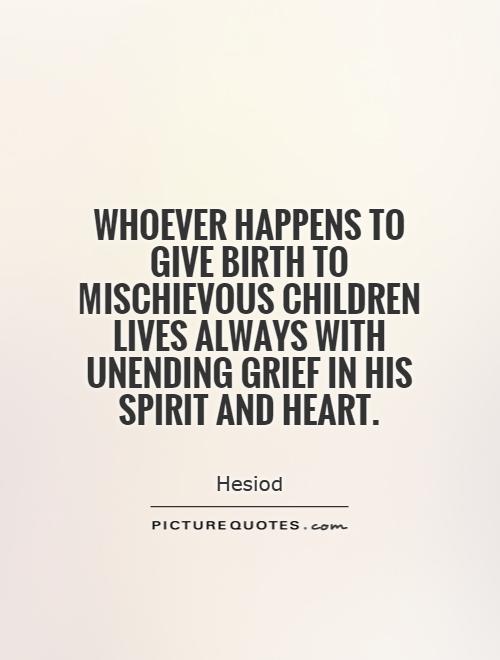Whoever happens to give birth to mischievous children lives always with unending grief in his spirit and heart

Whoever happens to give birth to mischievous children lives always with unending grief in his spirit and heart
In Hesiod's works, particularly in his poem "Works and Days," the idea that mischievous children bring unending grief to their parents is a recurring theme. Hesiod, a Greek poet who lived in the 8th century BC, often explored the complexities of family dynamics and the challenges of raising children in his writings.The quote "Whoever happens to give birth to mischievous children lives always with unending grief in his spirit and heart" reflects the belief that parents who have unruly or disobedient children will always carry a burden of sorrow and worry. In ancient Greek society, children were seen as a reflection of their parents' character and upbringing. Therefore, parents who had mischievous or troublesome children were often judged harshly by their peers and faced social stigma.
Hesiod's portrayal of the struggles of parenting mischievous children serves as a cautionary tale for his audience. He emphasizes the importance of discipline, guidance, and moral education in shaping the behavior of children. Parents are urged to instill virtues such as respect, obedience, and self-control in their children from a young age to prevent them from becoming sources of grief and shame.
The idea of unending grief also suggests that the consequences of raising mischievous children can have long-lasting effects on a parent's emotional well-being. The constant worry, frustration, and disappointment that come with dealing with unruly children can take a toll on a parent's spirit and heart, leading to feelings of sadness, guilt, and helplessness.
Overall, Hesiod's exploration of the challenges of parenting mischievous children highlights the complexities of family relationships and the importance of moral education in shaping the behavior of future generations. The quote serves as a reminder of the responsibilities and sacrifices that come with raising children and the enduring impact that their actions can have on their parents' lives.












 Friendship Quotes
Friendship Quotes Love Quotes
Love Quotes Life Quotes
Life Quotes Funny Quotes
Funny Quotes Motivational Quotes
Motivational Quotes Inspirational Quotes
Inspirational Quotes